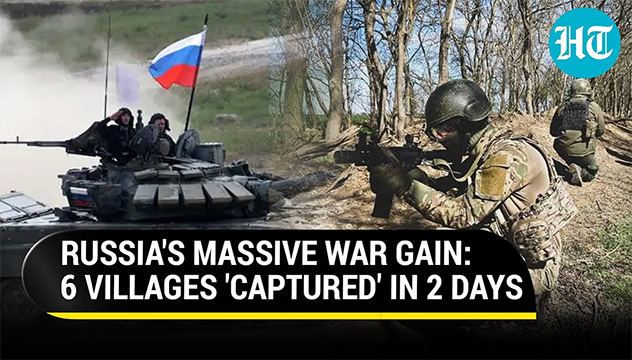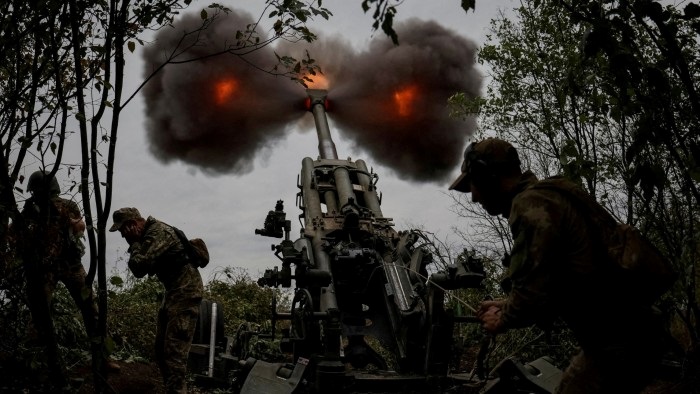
Washington and Kyiv have both made mistakes — and Moscow is taking advantage.
Roughly five Russian battalions have managed to advance nearly five miles into Ukraine in just a few days, capturing a number of villages and sending Ukrainian defenders reeling in what might be the fastest Russian advance since the start of the war in February 2022.
If the Russians continue to advance, they could once again get within artillery range of Kharkiv, Ukraine’s second-largest city, writes ‘The Washington Post’.
The worst-case scenario would be Kharkiv falling. That is still unlikely, but, to save the city, Ukraine is having to pull troops away from Donbas, making it easier for the Russians to advance in that region.
Why are the Russians having this sudden success? The explanation is a combination of Russian military prowess and Ukrainian and U.S. blunders.
The Russian forces have improved their combat performance since the early days of the war, when they could not seem to do anything right. They are adapting to battlefield conditions — for example, by using motorcycles to advance rapidly toward Ukrainian lines rather than relying on lumbering tanks and armored vehicles that can easily be picked off by Ukrainian drones and artillery. More significantly, they have been using heavy “glide bombs” to pulverize Ukrainian lines while their own electronic-warfare systems have been jamming Ukrainian drones and rockets.
Meanwhile, Ukraine’s armed forces have been severely handicapped by the long delay in approving U.S. aid. Ukrainian troops found themselves getting outgunned 10 to 1 in artillery ammunition, and their air-defense munitions have also been running dangerously low.
U.S. ammunition and weapons are now flowing, at long last, after Congress approved a $61 billion aid package, but it will take months to adequately supply all the Ukrainian forces. That creates a window of vulnerability the Russians are exploiting.
Ukraine’s government has also inadvertently enabled the Russian advance by being so slow to expand its armed forces and to build fortifications. While Russia has greatly increased the number of its troops in and around Ukraine — to nearly 500,000 — Ukraine still has only about 200,000 troops at the front. Many of its units, fighting nonstop for more than two years, have been badly depleted.
The Ukrainian manpower shortfall has long been evident, but it was only last month that parliament finally passed a new mobilization law. Ukraine now plans to create 10 additional brigades, but recruitment, training and arming will take months — time Ukraine doesn’t have.
Ukraine has also been scandalously slow to fortify its borders and front lines. Last year’s Ukrainian counteroffensive stalled out because Russian minefields, trenches and barriers proved impregnable. The lack of commensurate Ukrainian fortifications is now enabling Russia’s advance. “There was no first line of defense,” one Ukrainian officer in the Kharkiv region complained to the BBC. “The Russians… just walked in, without any mined fields.”
In March, Ukrainian President Volodymyr Zelensky finally announced an initiative to build 1,200 miles of fortifications across three lines of defense. Those lines are now being constructed, but they should have been in place many months ago. This delay reflects Zelensky’s failure to do more to mobilize Ukrainian society for the war.
Meanwhile construction of luxury apartment buildings continues in Kyiv and western Ukraine even as the country fights a war for survival.
The situation is much more dire than it needs to be, in part because of foreseeable fumbles on the part of both Kyiv and Washington, stresses ‘The Washington Post’.
 Photo: Financial Times
Photo: Financial Times
There is a large Russian operation going on in Ukraine focused on the Kharkov area. At the same time, the Russians are also attacking elsewhere, primarily in Donbas but also in Zaphorize. The threat in the north has compelled Ukraine to pull troops deployed elsewhere, including Chasiv Yar, to try and hold the line in the Kharkov area, notes Stephen Bryen, a former US Deputy Under Secretary of Defense.
If it was Russia's intention to force Ukraine's army to move its troops northwards, then it looks like a success so far. These troop movements will offer the Russian army the chance to do more damage to Ukraine's army.
The big question is what is the Russian objective. Military experts do not think Russia has enough new troops deployed (an additional 50,000) to actually take Kharkov. Some think maybe Russia will bring in additional forces to conquer Kharkov, but so far at least that has not happened.
There seems to be a strong conviction in NATO circles that Kharkov is the target. I am far less certain, and in fact it seems to me that is not the objective. While it is true that a cauldron is being built by the Russians around the city, my own belief is they want to fight the Ukrainians more out in the open than inside a big city. Kharkiv is Ukraine's second largest city.
Russia's objective is to force Ukraine's army to chase after invading Russian units. The idea is to cause heavy casualties on the Ukrainian side and, if all goes according to plan, either to split Ukraine's army into two, or disintegrate it altogether. In such a manner the idea is not just to take territory, but to destroy Ukraine's ability to resist.
There are many indicators that Russia is having success in the ongoing operation.
The first is that the commander of Ukraine's northern tier defense, Brigadier General Yuriy Halushkin, was fired by Zelensky on May 15th for his failure to properly organize the defenses in the Kharkov area. He was replaced by Major Genera Ihor Tantsyura. Firing Halushkin changes nothing on the battlefield.
The second is that Ukraine's defenses have not sufficed at all. Mostly it is digging deep trenches. There is little time to build cement bunkers. In any case, Russia is bringing in more flamethrowers and artillery to destroy the trenches. Reportedly Russian troops are going into trench fortifications and slugging it out with the defenders. While we don't know much about Russian casualties, we know the Ukraine's dead and wounded are climbing.
The third point is that Ukrainian armor has not been effective. One of the lessons of the Ukraine war is that armor is not any longer a front line weapon if armor can be destroyed by cheap drones, air launched mines, and antitank weapons. Reportedly another Abrams and at least one more Leopard tank were knocked out in the past few days. Large scale tank battles seem to be consigned to history.
The fourth point is that a larger number of Ukrainian troops are being captured, or are surrendering. For the most part these are hardened fighters, not recent conscripts, so the surrenders are psychologically significant. Also there are reports of units unwilling to carry out offensive tasks, or who retreat without orders from their commanders. The numbers are, as yet, not too high, but the Russians are doing their best to publicize them.
The fifth point is that at least two colonels in the palace protection force have been arrested and the head of Zelensky's security team has been dismissed. Zelensky says they were planning to kill him and other high officials, and he blamed the Russians. It is doubtful the Russians would try and knock off Zelensky unless they had another candidate to replace him, which – if they do – is far from obvious. If one looks at the war, the Russians have not targeted Zelensky although they may have tried to knock off Budanov, the head of Ukraine's GRU (military intelligence). Two weeks ago Russia put Zelensky, Budanov and others on their "wanted" list for unspecified crimes. The Russian list is not, as far as anyone knows, a kill list comparable to Ukraine's kill list, although that is not certain. Probably Zelensky used this as an excuse to arrest the colonels and blame the Russians, but it is not at all certain if he is right. It could just as well have been an attempted coup d'etat, and it could have been some of his NATO partners who have found Zelensky to be unpopular and problematic who were behind the operation. Of course it isn't convenient for Zelensky to say this, but the arrests and firing of the head of the service certainly sent out a clear message.
The final point is Zelensky and his army now know that the west is not going to send in troops to save him or Ukraine. I feel that my exposure of French troops, perhaps mercenaries (which Russia prefers to call them) and Macron's increasingly angst-driven threats to send in the French army, are fake. Washington has said no NATO troops. NATO has said no NATO troops. And now even Macron is saying he really didn't mean it. Forgive me for suggesting that my action helped contribute to shattering the immediate dream of NATO intervention, although it can't be dismissed into the more distant future.
Quite possibly the Ukrainian army cannot stay in the fight even in the medium term. There are not enough soldiers, and those still fighting are tired and some clearly dispirited. I believe Russia's immediate aim is to discombobulate Ukraine's army and is already well advanced.
read more in our Telegram-channel https://t.me/The_International_Affairs

 12:35 16.05.2024 •
12:35 16.05.2024 •






















